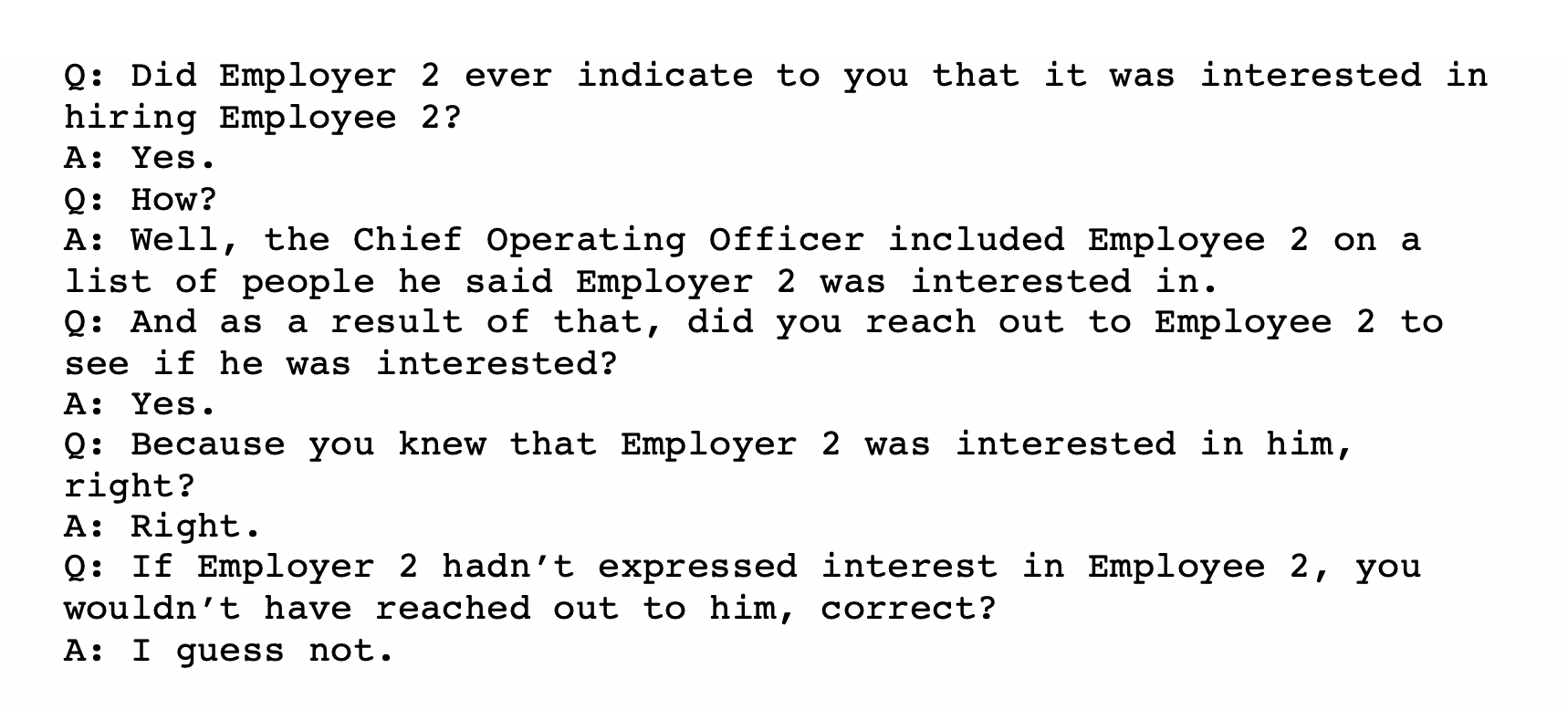 The knowing participation in breach of fiduciary duty theory in departing employee litigation
The knowing participation in breach of fiduciary duty theory in departing employee litigation
Conspiracy. Cooperation. Participation. “Collusion.” Which of these will get a company in legal trouble when it hires an employee away from a competitor?
A recurring problem in the law is deciding when a third party, let’s call it a “secondary” actor, is liable for the wrongful conduct of a “primary” actor. There are numerous legal theories for this, but in essence they all share two common elements:
(1) some level of knowledge or intent by the secondary actor
(2) some level of action taken by the secondary actor
The arguments usually center around how much knowledge and what level of action.
Let’s apply this to a common legal theory in departing employee litigation: breach of fiduciary duty. When an employee leaves a company to work for a competitor, the first company will often claim that the employee breached her fiduciary duty to the company, and that the subsequent employer “knowingly participated” in the employee’s breach of fiduciary duty.
What kind of evidence is necessary to prove such a claim?
An employee’s “fiduciary” duty
Before we get to that, let’s back up a bit and ask a more fundamental question: does an employee owe her employer a fiduciary duty?
The short answer: “sort of.” In Texas, where I practice law, an employee owes a kind of “fiduciary” duty to her employer, which I call Fiduciary Duty Lite.
I say “kind of” because a true fiduciary duty would include a duty to put the employer’s interests first and to disclose all material facts to the employer, but no one says an employee owes that kind of fiduciary duty.
Texas courts have said that it is not a violation of the employee’s fiduciary duty to make plans to compete with the employer and even to conceal those plans from the employer. See Johnson v. Brewer & Pritchard, P.C., 73 S.W.3d 193, 201 (Tex. 2002); Wooters v. Unitech Int’l, Inc., 513 S.W.3d 754, 763 (Tex. App.—Houston [1st Dist.] 2017, pet. denied); Abetter Trucking Co. v. Arizpe, 113 S.W.3d 503, 510 (Tex. App.—Houston [1st Dist.] 2003, no pet.). This policy recognizes the need for employee mobility.
So what kind of conduct violates an employee’s “fiduciary” duty? There are two key categories:
(1) misappropriating the company’s confidential information or trade secrets*
(2) soliciting the company’s employees or customers while still employed by the company
Why the asterisk on the first category? The problem is that the Uniform Trade Secrets Act expressly preempts common-law civil remedies for misappropriation of trade secrets. See Tex. Civ. Prac. & Rem. Code § 134A.007.
So, despite references to misappropriation of trade secrets in the fiduciary duty cases, in Texas you cannot assert a common-law breach of fiduciary duty claim based on allegations of taking or using trade secrets. Super Starr Int’l, LLC v. Fresh Tex Produce, LLC, 531 S.W.3d 829, 843 (Tex. App.—Corpus Christi 2017, no pet.).
The open question is whether TUTSA also preempts a fiduciary duty claim that is based on alleged misappropriation of information that is confidential but not a trade secret. So far, courts in Texas are split on that question. See Embarcadero Technologies, Inc. v. Redgate Software, Inc., No. 1:17-cv-444-RP, 2018 WL 315753, at *2-4 (W.D. Tex. Jan. 5, 2018).
That means in most cases the fiduciary duty claim is going to focus on allegations of solicitation of employees or customers.
Why does fiduciary duty matter?
But why does this matter when employment agreements often prohibit such solicitation? There are a few reasons.
First, in some cases the employee may not have a contract that prohibits soliciting employees and customers.
Second, even if the employee already has a contractual non-solicitation obligation, a breach of fiduciary duty claim gives the employee a potential remedy that a breach of contract claim typically does not: forfeiture or “disgorgement” of compensation as an alternative to actual damages. For a recent case awarding forfeiture on this theory, see Orbison Case Shows Need for Texas Courts to Limit Employee “Fiduciary” Duties.
Third, the fiduciary duty theory gives the first employer a potential claim against the second employer, who is usually a deeper pocket. The first employer can assert a claim for “knowing participation” in breach of fiduciary duty, which allows recovering damages from the second employer.
Knowing participation in breach of fiduciary duty
That brings us back to my original question: how does the first employer in a departing employee lawsuit prove knowing participation? I glean three essential elements from the case law:
- The employee solicited while still employed by the company
- The second employer knew about the solicitation
- The second employer participated in the solicitation
In practice, the knowledge element is somewhat redundant. If the second employer participates in the solicitation, it will almost always have knowledge of the solicitation. You are rarely going to find a case of “unknowing” participation. So the second employer’s participation is really the key element.
“Participation” sounds simple enough, but like “collusion” it can be more difficult to define in practice. To understand participation better, let’s take a look at a couple recent Texas cases applying knowing participation in breach of fiduciary duty to typical departing employee scenarios.
At the bottom of the deep blue sea . . .
In Wooters v. Unitech International, Inc., 513 S.W.3d 754 (Tex. App.—Houston [1st Dist.] 2017, pet. denied), Unitech operated in the offshore and subsea oil and gas production industry. Two Unitech employees made plans with Wooters, who has not a Unitech employee, to form a competing business called Infinity Subsea.
The jury found that Wooters conspired with the Unitech employees to breach their fiduciary duties, but the Court of Appeals held that the evidence was insufficient to support the jury’s verdict.
In reaching this decision, the court emphasized what is and is not a breach of an employee’s “fiduciary” duty. As we’ve seen already, making secret plans to compete with your employer is not a breach of fiduciary duty, even if it violates a contractual duty. Therefore, even though there was evidence that Wooters communicated with the employees about their plans to compete, that was no evidence that Wooters participated in any breach of fiduciary duty.
What about misappropriation of confidential information and trade secrets? As pointed out earlier, that can be a breach of fiduciary duty (putting aside the preemption problem).
There was evidence that the two employees misappropriated Unitech’s secret design information, and the jury even found that the two employees committed theft. But the jury answered “no” when asked if Wooters conspired with the employees to commit theft. So the jury’s “yes” answer to the conspiracy to breach fiduciary duty question had to be based on something else.
The only thing left was the possibility that Wooters participated in solicitation of Unitech customers or employees. But there was no evidence of this. “[N]othing in the record shows that Wooters possessed knowledge of and was complicit in Pennington and Kutach’s solicitations of employment of any Unitech employees,” and “Infinity Subsea did not hire any Unitech employee.” Id. at 766.
So the Court of Appeals reversed the trial court’s judgment against Wooters and rendered judgment that Unitech take nothing against Wooters. A big win for Wooters, obviously. (And this summary of the case does not do justice to the juicy facts, which included things like video surveillance of an employee and an office break-in.)
The practice tip I derive from Wooters is that if you represent the plaintiff claiming “knowing participation,” you need to tie the secondary actor’s participation to the part of the scheme that breached the employee’s fiduciary duty, not just to the scheme in general.
In other words, it’s not enough to show that the “participator” joined in a plan for the employees to compete with their employer. You’ve got to show he participated in the solicitation of employees or customers, or some other conduct that violated the employees’ fiduciary duties. This was the evidence that was lacking in Wooters.
But what if there had been evidence like that? Let’s say the Unitech employees, while employed by Unitech, had solicited a key Unitech engineer to go to a competing company they planned to join. Generally, that would be a breach of their fiduciary duty. And let’s suppose the new venture, Infinity Subsea, had communicated with the Unitech employees about the solicitation and hired the key engineer away from Unitech.
Surely, that would be sufficient evidence of the second employer’s “participation” in the employees’ breach of fiduciary duty, right?
I went down to the Crossroads . . .
Not necessarily. In Crossroads Hospice, Inc. v. FC Compassus, LLC, __ S.W.3d __, 2020 WL 1264188 (Tex. App.—Houston [1st Dist.] March 17, 2020), the same Court of Appeals held that facts like these were insufficient to prove that the second employer participated in the employee’s solicitation of another employee.
In the Crossroads case, Clement was the executive director of Compassus, a hospice care provider. Clement and several colleagues discussed leaving Compassus, Clement discussed those plans with a competitor, Crossroads, and Crossroads expressed hope that Clement could “bring her whole team.” While still employed by Compassus, Clement emailed Crossroads a list of staff and an introduction to another Compassus employee, Dr. Lee.
Here’s the kicker: when Crossroads later hired Dr. Lee, a Compassus VP asked Clement if she knew what was going on, and Clement pulled a Sargent Schultz: I know nothing.
Those facts were probably sufficient to make a case for breach of fiduciary duty against Clement, but the question was whether those facts established knowing participation by Crossroads. The Court of Appeals said no, for two reasons.
First, every one of the actions cited by Compassus was taken by Clement, not by Crossroads. Id. at *8.
Second, the fact that Crossroads knew what Clement was doing was not evidence that Crossroads participated in what Clement was doing.
“That Crossroads knew about Clement’s actions, and even approved of and benefited from them,” the court reasoned “does not constitute interference in the employment relationship or participation in the solicitation of these employees.” Id. The fact that Crossroads hired employees from Compassus was not “in and of itself” evidence that Crossroads knowingly participated in soliciting those employees. Id.
Thus, the Crossroads opinion sets the bar pretty high for evidence of participation. Perhaps too high. It seems clear from the emails that Clement and Crossroads were cooperating–perhaps even “colluding”?–in a plan for Clement to bring her “team” to Crossroads, with Crossroads at least implicitly encouraging Clement to do so. Is that not “participation”?
Wherever you come down on this, you probably agree that the decision in Crossroads slices the cheese pretty thin on what constitutes “participation.”
Don’t encourage him
That leads to my second practice tip. If you represent Employer 1 in this scenario, you need to try to obtain evidence that Employer 2 contributed to causing Employee 1 to solicit Employee 2. It may not be enough to show that Employee 1 and Employer 2 talked about soliciting Employee 2. Ideally you want to offer evidence that Employee 1 would not have solicited Employee 2 if Employer 2 had not encouraged it.
In a deposition or courtroom cross-examination of Employee 1, it might go something like this:

It won’t always go this smoothly in practice. But if you can get testimony like this, it may be enough to clear the “participation” hurdle the Crossroads opinion sets up.
On the other hand, if you represent Employer 2, you want to prepare Employee 1 for this kind of questioning.
Of course, there is only so much you can do. If the fact is that Employer 2 caused Employer 1 to solicit Employer 2, there may be no way around that. But if the second employer didn’t encourage the solicitation, you want to make sure the witness doesn’t stumble into saying it did.
Or maybe just tell the witness to repeat “there was no participation” a hundred times. It’s the new “collusion.”
_____________________________________

Zach Wolfe (zach@zachwolfelaw.com) is a Texas trial lawyer who handles non-compete and trade secret litigation at Zach Wolfe Law Firm. Thomson Reuters named him a Texas “Super Lawyer”® for Business Litigation in 2020 and 2021.
These are his opinions, not the opinions of his firm or clients, so don’t cite part of this post against him in an actual case. Every case is different, so don’t rely on this post as legal advice for your case.

 The knowing participation in breach of fiduciary duty theory in departing employee litigation
The knowing participation in breach of fiduciary duty theory in departing employee litigation

Comments: